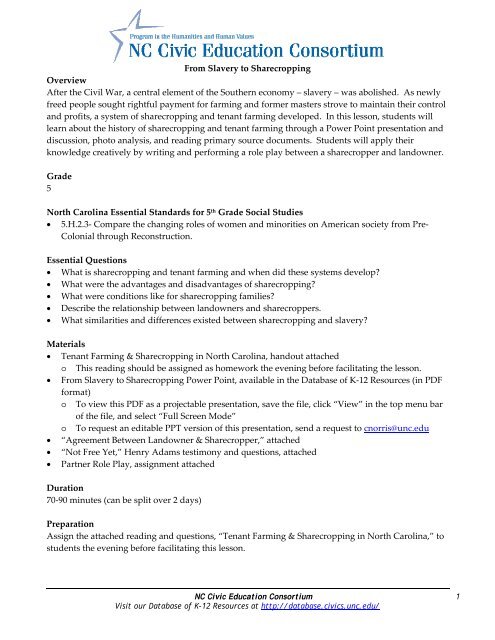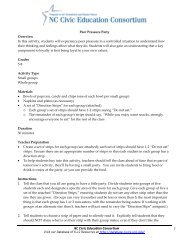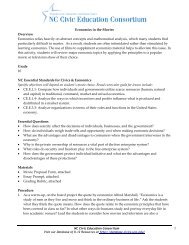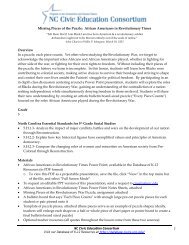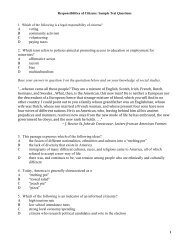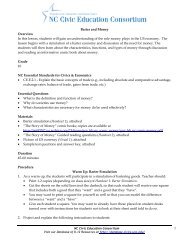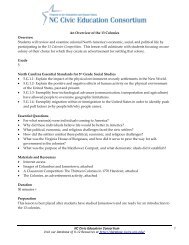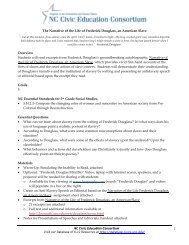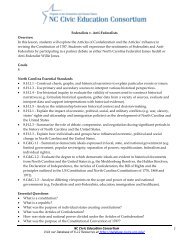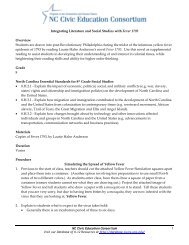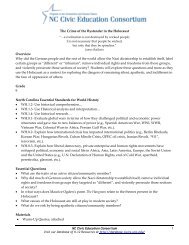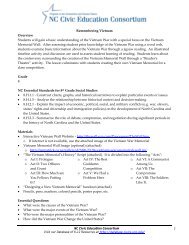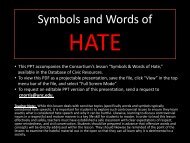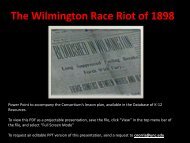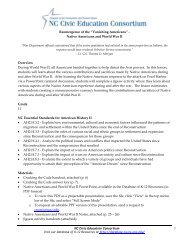From Slavery to Sharecropping - Database of K-12 Resources
From Slavery to Sharecropping - Database of K-12 Resources
From Slavery to Sharecropping - Database of K-12 Resources
You also want an ePaper? Increase the reach of your titles
YUMPU automatically turns print PDFs into web optimized ePapers that Google loves.
<strong>From</strong> <strong>Slavery</strong> <strong>to</strong> <strong>Sharecropping</strong><br />
Overview<br />
After the Civil War, a central element <strong>of</strong> the Southern economy – slavery – was abolished. As newly<br />
freed people sought rightful payment for farming and former masters strove <strong>to</strong> maintain their control<br />
and pr<strong>of</strong>its, a system <strong>of</strong> sharecropping and tenant farming developed. In this lesson, students will<br />
learn about the his<strong>to</strong>ry <strong>of</strong> sharecropping and tenant farming through a Power Point presentation and<br />
discussion, pho<strong>to</strong> analysis, and reading primary source documents. Students will apply their<br />
knowledge creatively by writing and performing a role play between a sharecropper and landowner.<br />
Grade<br />
5<br />
North Carolina Essential Standards for 5 th Grade Social Studies<br />
• 5.H.2.3‐ Compare the changing roles <strong>of</strong> women and minorities on American society from Pre‐<br />
Colonial through Reconstruction.<br />
Essential Questions<br />
• What is sharecropping and tenant farming and when did these systems develop?<br />
• What were the advantages and disadvantages <strong>of</strong> sharecropping?<br />
• What were conditions like for sharecropping families?<br />
• Describe the relationship between landowners and sharecroppers.<br />
• What similarities and differences existed between sharecropping and slavery?<br />
Materials<br />
• Tenant Farming & <strong>Sharecropping</strong> in North Carolina, handout attached<br />
o This reading should be assigned as homework the evening before facilitating the lesson.<br />
• <strong>From</strong> <strong>Slavery</strong> <strong>to</strong> <strong>Sharecropping</strong> Power Point, available in the <strong>Database</strong> <strong>of</strong> K‐<strong>12</strong> <strong>Resources</strong> (in PDF<br />
format)<br />
o To view this PDF as a projectable presentation, save the file, click “View” in the <strong>to</strong>p menu bar<br />
<strong>of</strong> the file, and select “Full Screen Mode”<br />
o To request an editable PPT version <strong>of</strong> this presentation, send a request <strong>to</strong> cnorris@unc.edu<br />
• “Agreement Between Landowner & Sharecropper,” attached<br />
• “Not Free Yet,” Henry Adams testimony and questions, attached<br />
• Partner Role Play, assignment attached<br />
Duration<br />
70‐90 minutes (can be split over 2 days)<br />
Preparation<br />
Assign the attached reading and questions, “Tenant Farming & <strong>Sharecropping</strong> in North Carolina,” <strong>to</strong><br />
students the evening before facilitating this lesson.<br />
NC Civic Education Consortium 1<br />
Visit our <strong>Database</strong> <strong>of</strong> K-<strong>12</strong> <strong>Resources</strong> at http://database.civics.unc.edu/
Procedure<br />
Warm‐Up: An Image <strong>of</strong> <strong>Sharecropping</strong><br />
1. As a warm‐up, project the image on Slide 2 <strong>of</strong> the “<strong>From</strong> <strong>Slavery</strong> <strong>to</strong> <strong>Sharecropping</strong> Power Point”<br />
and ask students <strong>to</strong> write down their first impressions and thoughts regarding the picture.<br />
Encourage students <strong>to</strong> think creatively by prompting as they write, reminding them there is no<br />
right or wrong answer:<br />
• What do you see here?<br />
• What observations can you make regarding the people (clothing, age, activities, emotional<br />
state, etc.) and setting?<br />
• What do you think is taking place in this image?<br />
• When (year, time, season, etc.) and where might this pho<strong>to</strong> have been taken? What evidence<br />
makes you think this?<br />
• What is the s<strong>to</strong>ry behind this image? (What was taking place before, during, and after this<br />
picture was taken?)<br />
• If the people pictured could speak, what might they say?<br />
• If you were <strong>to</strong> give this image a title, what would you title it and why?<br />
Once students have gathered their first impressions and interpretations on paper, allow them <strong>to</strong><br />
report back <strong>to</strong> class and discuss.<br />
Tenant Farming and <strong>Sharecropping</strong><br />
2. Explain <strong>to</strong> students that the image they are viewing relates <strong>to</strong> their homework reading (see<br />
“Preparation” above), since it is <strong>of</strong> a sharecropper in the early 1900s, Ask students <strong>to</strong> take out their<br />
homework and review the reading they completed, allowing students <strong>to</strong> share their answers <strong>to</strong><br />
the questions. Further discuss the system <strong>of</strong> sharecropping, pointing out additional advantages<br />
and disadvantages <strong>of</strong> such a system:<br />
• Advantages: provided an option for families who had no other choice; if the system was<br />
operated legitimately, farmers could feed their families and make a bit <strong>of</strong> pr<strong>of</strong>it. Freed slaves,<br />
who <strong>of</strong>ten had no other options, would be able <strong>to</strong> work for themselves and hopefully earn<br />
enough <strong>to</strong> survive.<br />
• Disadvantages: involved very hard labor and a low standard <strong>of</strong> living; tenant farmers<br />
generally moved from one farm <strong>to</strong> another thus it was hard <strong>to</strong> make friends or send children<br />
<strong>to</strong> school; North Carolina land was <strong>of</strong>ten eroded and drained <strong>of</strong> nutrients so successful crops<br />
were not a given. Also discuss with students how many previous slave owners used<br />
sharecropping <strong>to</strong> their advantage as a means <strong>to</strong> keep freed Blacks on the same land doing the<br />
same work. In some cases, unfair sharecropping simply replaced the cruel institution <strong>of</strong><br />
slavery.<br />
Origins <strong>of</strong> <strong>Sharecropping</strong>: The End <strong>of</strong> the Civil War<br />
3. Explain <strong>to</strong> students that while sharecropping and tenant farming were utilized in the United<br />
States up until the 1950s in some areas, you want them <strong>to</strong> focus on the period when these systems<br />
developed, which was after the Civil War. Use slides 3‐19 <strong>to</strong> convey additional knowledge <strong>to</strong><br />
students. Teachers may want <strong>to</strong> instruct students <strong>to</strong> take notes, but should ensure the PPT be<br />
used as a basis for class discussion rather than lecture. Take time <strong>to</strong> have students critically<br />
examine the various images <strong>of</strong> sharecroppers that are pictured (i.e., on slides 8, 14, 18, & 19), using<br />
probing questions such as:<br />
NC Civic Education Consortium 2<br />
Visit our <strong>Database</strong> <strong>of</strong> K-<strong>12</strong> <strong>Resources</strong> at http://database.civics.unc.edu/
• What do you see? What observations can you make regarding the people (clothing, age,<br />
activities, emotional state, etc.) and setting?<br />
• What do you think is taking place in this image?<br />
• When (year, time, season, etc.) and where might this pho<strong>to</strong> have been taken? What evidence<br />
makes you think this?<br />
• What is the s<strong>to</strong>ry behind this image? (What was taking place before, during, and after this<br />
picture was taken?)<br />
• If the people pictured could speak, what might they say?<br />
• If you were <strong>to</strong> give this image a title, what would you title it and why?<br />
• What do you notice about the age <strong>of</strong> those represented in the images? How do you imagine<br />
their lives compare and contrast with your own as young people <strong>to</strong>day?<br />
• Based on what you have learned and see in these images, what were living conditions like for<br />
sharecropping families?<br />
• How do you think sharecropping affected the health and lifespan <strong>of</strong> these families?<br />
• Why do you think people decided <strong>to</strong> be sharecroppers?<br />
A <strong>Sharecropping</strong> Contract<br />
4. Slides 9‐11 deal with contracts for sharecropping. When going over this information, pause on<br />
Slide 11 and break students up in<strong>to</strong> groups <strong>of</strong> 3‐4. Provide each group with a copy <strong>of</strong> the attached<br />
primary source document, which is a copy <strong>of</strong> an actual sharecropping contract from 1879. Tell<br />
students <strong>to</strong> imagine that they are a team <strong>of</strong> lawyers and that John Dawson has brought them this<br />
contract <strong>to</strong> review for him; he wants <strong>to</strong> know if it is a good deal and whether or not he should<br />
agree <strong>to</strong> it. Tell students they have a great responsibility and that even though the document<br />
might be written in legal language and thus difficult <strong>to</strong> quickly understand, they must work their<br />
hardest for John Dawson and be able <strong>to</strong> tell him exactly what this contract is stating. Tell students<br />
<strong>to</strong> assign a discussion leader and a note‐taker and give them around 15 minutes <strong>to</strong> review the<br />
contract.<br />
Afterwards, discuss the contract as a class:<br />
• According <strong>to</strong> the contract, what is Dawson responsible for?<br />
• What powers does Solid South have over Dawson?<br />
• What does the contract stipulate regarding how long Dawson can use and live on the land?<br />
• What arrangement is made regarding supplies?<br />
• What arrangement is made regarding Solid South’s cot<strong>to</strong>n gin? Does this seem like a fair<br />
deal? Why or why not?<br />
• How does Solid South secure his payment <strong>of</strong> rent and supplies? What might this mean for<br />
Dawson?<br />
• Based on your critique <strong>of</strong> this contract, is it fair? Why or why not?<br />
• Who does the contract benefit overall? What evidence makes you draw this conclusion?<br />
• Why might Dawson agree <strong>to</strong> sign this contract? (Remind students that many former slaves<br />
were unable <strong>to</strong> read. Since even a literate person may have trouble with such legal language,<br />
an illiterate person would likely be at the mercy <strong>of</strong> the landowner <strong>to</strong> “explain” <strong>to</strong> them what<br />
the contract was saying. The likelihood <strong>of</strong> that explanation being honest was slim. Also,<br />
many former slaves were poor, without options, and intimidated by widespread violence after<br />
the Civil War. Thus many former slaves agreed <strong>to</strong> sharecropping contracts, such as this one,<br />
that were designed <strong>to</strong> keep them poor.)<br />
NC Civic Education Consortium 3<br />
Visit our <strong>Database</strong> <strong>of</strong> K-<strong>12</strong> <strong>Resources</strong> at http://database.civics.unc.edu/
Tell students <strong>to</strong> assume that Dawson signed the contract and ask them <strong>to</strong> predict what may have<br />
happened <strong>to</strong> him as he sharecropped for Solid South.<br />
Not Free Yet<br />
5. Upon completion <strong>of</strong> the Power Point, give students the attached primary source, “Not Free Yet,”<br />
explaining that it is a first‐hand account from former slave Henry Adams, who testified before the<br />
U.S. Senate in 1880 about the early days <strong>of</strong> his freedom, describing white planters’ unfair labor<br />
practices and the violent, intimidating atmosphere in which ex‐slaves felt compelled <strong>to</strong> work for<br />
their former masters. Teachers should let students know in advance that the passage contains<br />
racial slurs, and that while such racist language was a reality faced by those enslaved and newly<br />
freed, this is language that is unacceptable <strong>to</strong> use. Ensure students understand the importance <strong>of</strong><br />
their sensitivity and maturity regarding such his<strong>to</strong>ry. Instruct students <strong>to</strong> read the passage and<br />
answer the questions that follow.<br />
‣ Teacher Note: Teachers with limited time can assign this reading for homework, discussing it<br />
and completing the remaining activity the following day.<br />
6. As a culminating activity, partner students up and give them the attached role‐play assignment<br />
sheet, which instructs them <strong>to</strong> write and perform a realistic dialogue between a sharecropper and<br />
a landowner. Discuss with students the importance <strong>of</strong> his<strong>to</strong>rical accuracy, but ask that they<br />
refrain from using any racial slurs. Also encourage students <strong>to</strong> explore all <strong>of</strong> the realistic ways the<br />
scene could end up.<br />
7. Allow students <strong>to</strong> perform their scenes for classmates. Before performing, review your<br />
expectations for respectful audience members and encourage students <strong>to</strong> <strong>of</strong>fer positive feedback<br />
after each scene. (Teachers with limited class time can only have volunteers present, or can have<br />
students get in<strong>to</strong> groups <strong>of</strong> 4‐6 and present in these smaller clusters.) After scenes have been<br />
presented, review and close with a culminating discussion:<br />
• Based on what we have discussed and examined, how would you describe the systems <strong>of</strong><br />
tenant farming and sharecropping?<br />
• What do you think would have been most difficult about sharecropping after the Civil War?<br />
• What similarities and differences existed between sharecropping and slavery? Do you feel<br />
sharecropping simply extended slavery in<strong>to</strong> a time when all people were <strong>to</strong> be free, or did it<br />
provide opportunities for freed people <strong>to</strong> start a life? Explain.<br />
• What characteristics were necessary for a person <strong>to</strong> be successful as a sharecropper?<br />
Additional Activities<br />
• Research African American founded communities in NC, such as Raleigh’s Oberlin Village or the<br />
coast’s Princeville, where African Americans worked <strong>to</strong> create a new life beyond the inequalities<br />
<strong>of</strong> slavery and sharecropping. (See the Consortium’s unit, “Against All Odds: The African<br />
American Founding <strong>of</strong> Princeville, NC,” available in the <strong>Database</strong> <strong>of</strong> Civic <strong>Resources</strong>.)<br />
• Research organizations such as the Farm Service Agency, the National Farmers Alliance, and the<br />
Federal Emergency Relief Administration. Evaluate the effectiveness <strong>of</strong> these agencies in helping<br />
improve the life <strong>of</strong> sharecroppers.<br />
NC Civic Education Consortium 4<br />
Visit our <strong>Database</strong> <strong>of</strong> K-<strong>12</strong> <strong>Resources</strong> at http://database.civics.unc.edu/
• Research the Great Migration, when many African‐Americans who wanted <strong>to</strong> avoid the racial<br />
segregation <strong>of</strong> Jim Crow laws in the South sought refuge in the supposed ʺPromise Landʺ <strong>of</strong> the<br />
North. Many sharecroppers were also forced <strong>to</strong> seek employment in the North when the boll<br />
weevil infestation <strong>of</strong> Southern cot<strong>to</strong>n fields eliminated farm work. (See the Consortium’s lesson<br />
“The Industrial Revolution: Life in the Cities.”)<br />
NC Civic Education Consortium 5<br />
Visit our <strong>Database</strong> <strong>of</strong> K-<strong>12</strong> <strong>Resources</strong> at http://database.civics.unc.edu/
Name: _____________________________<br />
Tenant Farming and <strong>Sharecropping</strong> in North Carolina<br />
By the year 1869 the Civil War had ended and Reconstruction was underway. Those enslaved were<br />
free under the Thirteenth Amendment, yet recovery for the South continued <strong>to</strong> be slow and harsh. It<br />
became clear that Congress would not be granting land <strong>to</strong> impoverished freedmen, and the concept <strong>of</strong><br />
“40 acres and a mule” became a distant memory. Free Blacks, as well as poor Whites, had <strong>to</strong> find a<br />
way <strong>to</strong> make a living in a Southern region devastated for years <strong>to</strong> come by the after affects <strong>of</strong> war.<br />
Many people were left without money or land; however, they did have the skills <strong>to</strong> be able <strong>to</strong> grow<br />
crops. Likewise, landowners <strong>of</strong>ten had plenty <strong>of</strong> land but little money for wages. Thus, many turned<br />
<strong>to</strong> a system <strong>of</strong> farming called tenant farming and sharecropping.<br />
Tenant farmers usually paid the landowner rent for farmland and a house. They owned the crops they<br />
planted and made their own decisions about them. After harvesting the crop, the tenant sold it and<br />
received income from it. <strong>From</strong> that income, he paid the landowner the amount <strong>of</strong> rent owed.<br />
Sharecroppers seldom owned anything. Instead, they borrowed practically everything — not only the<br />
land and a house but also supplies, draft animals, <strong>to</strong>ols, equipment, and seeds. The sharecropper<br />
contributed his, and his family’s, labor. Sharecroppers had no control over which crops were planted or<br />
how they were sold. After harvesting the crop, the landowner sold it and applied its income <strong>to</strong>ward<br />
settling the sharecropper’s account. Most tenant farmers and sharecroppers bought everything they<br />
needed on credit from local merchants, hoping <strong>to</strong> make enough money at harvest time <strong>to</strong> pay their<br />
debts.<br />
By 1880, more than 1/3 <strong>of</strong> NC farms operated under systems <strong>of</strong> sharecropping or tenant farming.<br />
While this system may have assisted some poor people in earning a bare living, landowners were<br />
easily able <strong>to</strong> take advantage <strong>of</strong> vulnerable workers and unfortunately, tens <strong>of</strong> thousands <strong>of</strong> farmers fell<br />
down the tenancy ladder rather than moving up it. Some farmers lost everything because <strong>of</strong> crop<br />
failures, low cot<strong>to</strong>n prices, ill health, exhaustion <strong>of</strong> the soil, excessive interest rates, or inability <strong>to</strong><br />
compete with tenant labor.<br />
Many sharecroppers were freed slaves, working the same land that they had once been enslaved upon.<br />
Sharecroppers were also <strong>of</strong>ten uneducated and could not read or write, thus landowners could easily<br />
take advantage <strong>of</strong> the situation. Landowners were in charge <strong>of</strong> selling the crops and keeping records <strong>of</strong><br />
any dept the sharecropper owed them. While sharecroppers always held hope that the yield <strong>of</strong> crops<br />
would be large, and that their debt (<strong>of</strong>ten for items like seeds and <strong>to</strong>ols) had been paid <strong>to</strong> the<br />
landowner, sharecroppers <strong>of</strong>ten ended up empty handed. The landowner need only tweak the numbers<br />
a bit, and a sharecropper would remain indebted <strong>to</strong> the landowner year after year. If the sharecropper<br />
tried <strong>to</strong> leave, he could be jailed for running out on such debt, legitimate or not. The legal system was<br />
likely <strong>to</strong> take the word <strong>of</strong> a rich, white landowner over a poor person and/or freed slave. The<br />
sharecropper system could thus be very pr<strong>of</strong>itable for a landowner, but a never-ending, unfair cycle for<br />
a sharecropper and his family. Landowners could also order sharecroppers <strong>to</strong> leave their land at any<br />
point for any reason. Such would <strong>of</strong>ten occur if a sharecropper became ill or injured.<br />
NC Civic Education Consortium 6<br />
Visit our <strong>Database</strong> <strong>of</strong> K-<strong>12</strong> <strong>Resources</strong> at http://database.civics.unc.edu/
The Industrial Revolution and the First World War brought temporary prosperity <strong>to</strong> both agriculture<br />
and forestry in North Carolina. Agriculture expanded <strong>to</strong> meet the increased demand for food and<br />
fertilizers were becoming available. However, sharecroppers saw little <strong>of</strong> this brief time period <strong>of</strong><br />
prosperity, since the twenties and thirties brought the Great Depression. The boom years <strong>of</strong> the WWI<br />
were over and farm prices again dropped severely. Cot<strong>to</strong>n sold for 35 cents per pound in 1919 but<br />
dropped <strong>to</strong> only 6 cents per pound in 1931. Total national farm income was 16.9 billion in 1919, and<br />
only 5.3 billion in 1932.<br />
The rural pattern at this time in North Carolina was small farms, poverty, and a terribly poor standard<br />
<strong>of</strong> living. In 1923 a survey was made <strong>of</strong> 351 rural families in Chatham County, North Carolina, both<br />
white and black. Almost half were tenants and sharecroppers. None <strong>of</strong> the 175 had running water, and<br />
only eight even had outside bathrooms. The others had no sanitary facilities whatsoever. The average<br />
daily income for a member <strong>of</strong> a sharecropping family was 9 cents.<br />
Sources: http://www.agr.state.nc.us/stats/his<strong>to</strong>ry/his<strong>to</strong>ry.htm; http://digital.library.okstate.edu/encyclopedia/entries/T/TE009.html<br />
1. Summarize the system <strong>of</strong> tenant farming and share cropping. Why did these systems develop?<br />
2. Why did many freed slaves become sharecroppers? What do you think would be at risk for a freed<br />
slave <strong>to</strong> become a sharecropper on his former master’s plantation?<br />
3. If you had <strong>to</strong> choose between being a tenant farmer or a sharecropper, which would you choose and<br />
why?<br />
4. How would you characterize the life <strong>of</strong> a sharecropper?<br />
5. What were the risks involved in tenant farming and share cropping?<br />
6. In what ways were sharecroppers <strong>of</strong>ten taken advantage <strong>of</strong>?<br />
NC Civic Education Consortium 7<br />
Visit our <strong>Database</strong> <strong>of</strong> K-<strong>12</strong> <strong>Resources</strong> at http://database.civics.unc.edu/
Agreement between Landlord and Sharecropper<br />
This agreement, made and entered in<strong>to</strong> this 18th day <strong>of</strong> January, 1879, between Solid South, <strong>of</strong> the first part, and<br />
John Dawson, <strong>of</strong> the second part.<br />
Witnesseth: that said party <strong>of</strong> the first part for and in consideration <strong>of</strong> eighty-eight pounds <strong>of</strong> lint cot<strong>to</strong>n <strong>to</strong> be<br />
paid <strong>to</strong> the said Solid South, as hereinafter expressed, hereby leases <strong>to</strong> said Dawson, for the year A. D. 1879, a<br />
certain tract <strong>of</strong> land, the boundaries <strong>of</strong> which are well unders<strong>to</strong>od by the parties here<strong>to</strong>, and the area <strong>of</strong> which the<br />
said parties hereby agree <strong>to</strong> be fifteen acres, being a portion <strong>of</strong> the Waterford Plantation, in Madison Parish,<br />
Louisiana.<br />
The said Dawson is <strong>to</strong> cultivate said land in a proper manner, under the general superintendence <strong>of</strong> the said<br />
Solid South, or his agent or manager, and is <strong>to</strong> surrender <strong>to</strong> said lessor peaceable possession <strong>of</strong> said leased<br />
premises at the expiration <strong>of</strong> this lease without notice <strong>to</strong> quit. All ditches, turn-rows, bridges, fences, etc. on said<br />
land shall be kept in proper condition by said Dawson, or at his expense. All cot<strong>to</strong>n-seed raised on said land<br />
shall be held for the exclusive use <strong>of</strong> said plantation, and no goods <strong>of</strong> any kind shall be kept for sale on any said<br />
land unless by consent <strong>of</strong> said lessor.<br />
If said Solid South shall furnish <strong>to</strong> said lessee money or necessary supplies, or s<strong>to</strong>ck, or material, or either or all<br />
<strong>of</strong> them during this lease, <strong>to</strong> enable him <strong>to</strong> make a crop, the amount <strong>of</strong> said advances, not <strong>to</strong> exceed $475 (<strong>of</strong><br />
which $315 has been furnished in two mules, plows, etc.), the said Dawson agrees <strong>to</strong> pay for the supplies and<br />
advances so furnished, out <strong>of</strong> the first cot<strong>to</strong>n picked and saved on said land from the crop <strong>of</strong> said year, and <strong>to</strong><br />
deliver said cot<strong>to</strong>n <strong>of</strong> the first picking <strong>to</strong> the said Solid South, in the gin on said plantation, <strong>to</strong> be by him bought<br />
or shipped at his option, the proceeds <strong>to</strong> be applied <strong>to</strong> payment <strong>of</strong> said supply bill, which is <strong>to</strong> be fully paid on or<br />
before the 1st day <strong>of</strong> January, 1880.<br />
After payment <strong>of</strong> said supply bill, the said lessee is <strong>to</strong> pay <strong>to</strong> said lessor, in the gin <strong>of</strong> said plantation, the rent<br />
cot<strong>to</strong>n herein before stipulated, said rent <strong>to</strong> be fully paid on or before the 1st day <strong>of</strong> January, 1880. All cot<strong>to</strong>n<br />
raised on said land is <strong>to</strong> be ginned on the gin <strong>of</strong> said lessor, on said plantation, and said lessee is <strong>to</strong> pay $4 per<br />
bale for ginning same.<br />
To secure payment <strong>of</strong> said rent and supply bill, the said Dawson grants un<strong>to</strong> said Solid South a special privilege<br />
and right <strong>of</strong> pledge on all the products raised on said land, and on all his s<strong>to</strong>ck, farming implements, and<br />
personal property, and hereby waives in favor <strong>of</strong> said Solid South the benefit <strong>of</strong> any and all homestead laws and<br />
exemption laws now in force, or which may be in force, in Louisiana, and agrees that all his property shall be<br />
seized and sold <strong>to</strong> pay said rent and supply bill in default <strong>of</strong> payment there<strong>of</strong> as herein agreed. Any violation <strong>of</strong><br />
this contract shall render the lease void.<br />
[signed]<br />
Solid South<br />
John Dawson<br />
X (his mark)<br />
Excerpt from Nell Irvin Painter, Exodusters: Black Migration <strong>to</strong> Kansas after Reconstruction. New York: Alfred A. Knopf, 1977; Source:<br />
http://www.pbs.org/wgbh/amex/reconstruction/sharecrop/ps_dawson.html<br />
NC Civic Education Consortium 8<br />
Visit our <strong>Database</strong> <strong>of</strong> K-<strong>12</strong> <strong>Resources</strong> at http://database.civics.unc.edu/
Not Free Yet<br />
Freed by the Emancipation Proclamation in 1865, former slave Henry Adams testified before the U.S. Senate<br />
fifteen years later about the early days <strong>of</strong> his freedom, describing white planters’ unfair labor practices and the<br />
violent, intimidating atmosphere in which ex-slaves felt compelled <strong>to</strong> work for their former masters.<br />
The white men read a paper <strong>to</strong> all <strong>of</strong> us colored people telling us that we were free and could go where we<br />
pleased and work for who we pleased. The man I belonged <strong>to</strong> <strong>to</strong>ld me it was best <strong>to</strong> stay with him. He said, “The<br />
bad white men was mad with the Negroes because they were free and they would kill you all for fun.” He said,<br />
stay where we are living and we could get protection from our old masters.<br />
I <strong>to</strong>ld him I thought that every man, when he was free, could have his rights and protect themselves. He said,<br />
“The colored people could never protect themselves among the white people. So you had all better stay with the<br />
white people who raised you and make contracts with them <strong>to</strong> work by the year for one-fifth <strong>of</strong> all you make.<br />
And next year you can get one-third, and the next you maybe work for one-half you make. We have contracts<br />
for you all <strong>to</strong> sign, <strong>to</strong> work for one-twentieth you make from now until the crop is ended, and then next year you<br />
all can make another crop and get more <strong>of</strong> it.”<br />
I <strong>to</strong>ld him I would not sign anything. I said, “I might sign <strong>to</strong> be killed. I believe the white people is trying <strong>to</strong> fool<br />
us.” But he said again, “Sign this contract so I can take it <strong>to</strong> the Yankees and have it recorded.” All our colored<br />
people signed it but myself and a boy named Samuel Jefferson. All who lived on the place was about sixty,<br />
young and old.<br />
On the day after all had signed the contracts, we went <strong>to</strong> cutting oats. I asked the boss, “Could we get any <strong>of</strong> the<br />
oats?” He said, “No; the oats were made before you were free.” After that he <strong>to</strong>ld us <strong>to</strong> get timber <strong>to</strong> build a<br />
sugar-mill <strong>to</strong> make molasses. We did so. On the 13 th day <strong>of</strong> July 1865 we started <strong>to</strong> pull fodder. I asked the boss<br />
would he make a bargain <strong>to</strong> give us half <strong>of</strong> all the fodder we would pull. He said we may pull two or three stacks<br />
and then we could have all the other. I <strong>to</strong>ld him we wanted half, so if we only pulled two or three stacks we<br />
would get half <strong>of</strong> that. He said, “All right.” We got that and part <strong>of</strong> the corn we made. We made five bales <strong>of</strong><br />
cot<strong>to</strong>n but we did not get a pound <strong>of</strong> that. We made two or three hundred gallons <strong>of</strong> molasses and only got what<br />
we could eat. We made about eight-hundred bushel <strong>of</strong> pota<strong>to</strong>es; we got a few <strong>to</strong> eat. We split rails three or four<br />
weeks and got not a cent for that.<br />
In September I asked the boss <strong>to</strong> let me go <strong>to</strong> Shreveport. He said, “All right, when will you come back?” I <strong>to</strong>ld<br />
him “next week.” He said, “You had better carry a pass.” I said, “I will see whether I am free by going without a<br />
pass.”<br />
I met four white men about six miles south <strong>of</strong> Keachie, De So<strong>to</strong> Parish. One <strong>of</strong> them asked me who I belonged<br />
<strong>to</strong>. I <strong>to</strong>ld him no one. So him and two others struck me with a stick and <strong>to</strong>ld me they were going <strong>to</strong> kill me and<br />
every other Negro who <strong>to</strong>ld them that they did not belong <strong>to</strong> anyone. One <strong>of</strong> them who knew me <strong>to</strong>ld the others,<br />
“Let Henry alone for he is a hard-working nigger and a good nigger.” They left me and I then went on <strong>to</strong><br />
Shreveport. I seen over twelve colored men and women, beat, shot and hung between there and Shreveport.<br />
Sunday I went back home. The boss was not at home. I asked the madame, “where was the boss?” She says,<br />
“Now, the boss; now, the boss! You should say ‘master’ and ‘mistress’ – and shall or leave. We will not have no<br />
nigger here on our place who cannot say ‘mistress’ and ‘master.’ You all are not free yet and will not be until<br />
Congress sits, and you shall call every white lady ‘missus’ and every white man ‘master.’”<br />
During the same week the madame takin’ a stick and beat one <strong>of</strong> the young colored girls, who was about fifteen<br />
years <strong>of</strong> age and who is my sister, and split her back. The boss came next day and take this same girl (my sister)<br />
and whipped her nearly <strong>to</strong> death, but in the contracts he was <strong>to</strong> hit no one any more. After the whipping a large<br />
number <strong>of</strong> young colored people taken a notion <strong>to</strong> leave. On the 18 th <strong>of</strong> September I and eleven men and boys<br />
left that place and started for Shreveport. I had my horse along. My brother was riding him, and all <strong>of</strong> our things<br />
NC Civic Education Consortium 9<br />
Visit our <strong>Database</strong> <strong>of</strong> K-<strong>12</strong> <strong>Resources</strong> at http://database.civics.unc.edu/
was packed on him. Out come about forty armed men (white) and shot at us and takin’ my horse. Said they were<br />
going <strong>to</strong> kill ever’ nigger they found leaving their masters; and taking all <strong>of</strong> our clothes and bed-clothing and<br />
money. I had <strong>to</strong> work away <strong>to</strong> get a white man <strong>to</strong> get my horse.<br />
Then I got a wagon and went <strong>to</strong> peddling, and had <strong>to</strong> get a pass, according <strong>to</strong> the laws <strong>of</strong> the parishes, <strong>to</strong> do so.<br />
In Oc<strong>to</strong>ber I was searched for pis<strong>to</strong>ls and robbed <strong>of</strong> $250 by a large crowd <strong>of</strong> white men and the law would do<br />
nothing about it. The same crowd <strong>of</strong> white men broke up five churches (colored). When any <strong>of</strong> us would leave<br />
the white people, they would take everything we had, all the money that we made on their places. They killed<br />
many hundreds <strong>of</strong> my race when they were running away <strong>to</strong> get freedom.<br />
After they <strong>to</strong>ld us we were free – even then they would not let us live as man and wife <strong>to</strong>gether. And when we<br />
would run away <strong>to</strong> be free, the white people would not let us come on their places <strong>to</strong> see our mothers, wives,<br />
sisters, or fathers. We was made <strong>to</strong> leave or go back and live as slaves. To my own knowledge there was over<br />
two thousand colored people killed trying <strong>to</strong> get away after the white people <strong>to</strong>ld us we were free in 1865. This<br />
was between Shreveport and Logansport.<br />
Excerpt from Senate Report 693, 46 th Congress, 2 nd Session (1880). Reprinted in Dorothy Sterling, edi<strong>to</strong>r, The Trouble<br />
They Seen: The S<strong>to</strong>ry <strong>of</strong> Reconstruction in the Words <strong>of</strong> African Americans. New York: Da Capo Press, 1994.<br />
Source: http://www.pbs.org/wgbh/amex/reconstruction/sharecrop/ps_adams.html<br />
Answer the following questions on notebook paper:<br />
1. What advice does Henry’s former master give him when he “frees” him? What do you think his motive is<br />
in giving such advice?<br />
2. Why did Henry refuse <strong>to</strong> sign the contract presented by his former master?<br />
3. Is the working relationship between the former slaves and their former master a pr<strong>of</strong>itable one for them?<br />
Explain.<br />
4. Why does Henry not take the pass from his boss?<br />
5. What happens <strong>to</strong> Henry as he travels <strong>to</strong> Shreveport?<br />
6. Describe the Madame’s mentality. How does this illustrate the complexities <strong>of</strong> freedom for Blacks after the<br />
Civil War?<br />
7. Why does Henry decide <strong>to</strong> leave the place <strong>of</strong> his former enslavement?<br />
8. What happens <strong>to</strong> Henry and the 11 freed people with him as they travel away?<br />
9. What rights and legal protection does Henry have as a freed slave? How do you imagine this would feel <strong>to</strong><br />
know you could be robbed with no recourse?<br />
10. How do you imagine Henry would describe the freedom he has experienced thus far?<br />
NC Civic Education Consortium 10<br />
Visit our <strong>Database</strong> <strong>of</strong> K-<strong>12</strong> <strong>Resources</strong> at http://database.civics.unc.edu/
Partner Role Play: Sharecropper and Landowner<br />
Based on the following roles, determine what each person would realistically say and do given the<br />
situation. Write a dialogue between these two people that may have occurred right after the Civil War.<br />
Be prepared <strong>to</strong> read/perform your scene in front <strong>of</strong> class. Your scene should have a beginning, middle,<br />
and end, and should be no longer than 3-4 minutes (2-3 pages). While your scene may involve a<br />
dispute and should be written with his<strong>to</strong>rical accuracy, please refrain from using any racial slurs.<br />
• One <strong>of</strong> you will assume the role <strong>of</strong> a sharecropper living in North Carolina in the late 1860s.<br />
The landowner doesn’t realize this, but you have learned how <strong>to</strong> read and write, and you have<br />
been keeping your own records <strong>of</strong> the amount <strong>of</strong> debt you owe the landowner, as well as the<br />
amount <strong>of</strong> crops that have been yielded. Your records say you are owed money, but you have a<br />
feeling the landowner is going <strong>to</strong> try <strong>to</strong> cheat you.<br />
• One <strong>of</strong> you will assume the role <strong>of</strong> a landowner in North Carolina. The sharecropper and his<br />
family currently living on your farm are hard workers and because <strong>of</strong> them, you have been able<br />
<strong>to</strong> have successful crops that have produced quite a pr<strong>of</strong>it. You don’t want <strong>to</strong> lose them, so you<br />
have fixed your records <strong>to</strong> show that the sharecropper is in debt <strong>to</strong> you for another year <strong>of</strong><br />
work.<br />
-----------------------------------------------------------------------------------------------------------------------------------------------------<br />
Partner Role Play: Sharecropper and Landowner<br />
Based on the following roles, determine what each person would realistically say and do given the<br />
situation. Write a dialogue between these two people that may have occurred right after the Civil War.<br />
Be prepared <strong>to</strong> read/perform your scene in front <strong>of</strong> class. Your scene should have a beginning, middle,<br />
and end, and should be no longer than 3-4 minutes when performed (2-3 pages). While your scene<br />
may involve a dispute and should be written with his<strong>to</strong>rical accuracy, please refrain from using any<br />
racial slurs.<br />
• One <strong>of</strong> you will assume the role <strong>of</strong> a sharecropper living in North Carolina in the late 1860s.<br />
The landowner doesn’t realize this, but you have learned how <strong>to</strong> read and write, and you have<br />
been keeping your own records <strong>of</strong> the amount <strong>of</strong> debt you owe the landowner, as well as the<br />
amount <strong>of</strong> crops that have been yielded. Your records say you are owed money, but you have a<br />
feeling the landowner is going <strong>to</strong> try <strong>to</strong> cheat you.<br />
• One <strong>of</strong> you will assume the role <strong>of</strong> a landowner in North Carolina. The sharecropper and his<br />
family currently living on your farm are hard workers and because <strong>of</strong> them, you have been able<br />
<strong>to</strong> have successful crops that have produced quite a pr<strong>of</strong>it. You don’t want <strong>to</strong> lose them, so you<br />
have fixed your records <strong>to</strong> show that the sharecropper is in debt <strong>to</strong> you for another year <strong>of</strong><br />
work.<br />
NC Civic Education Consortium 11<br />
Visit our <strong>Database</strong> <strong>of</strong> K-<strong>12</strong> <strong>Resources</strong> at http://database.civics.unc.edu/


